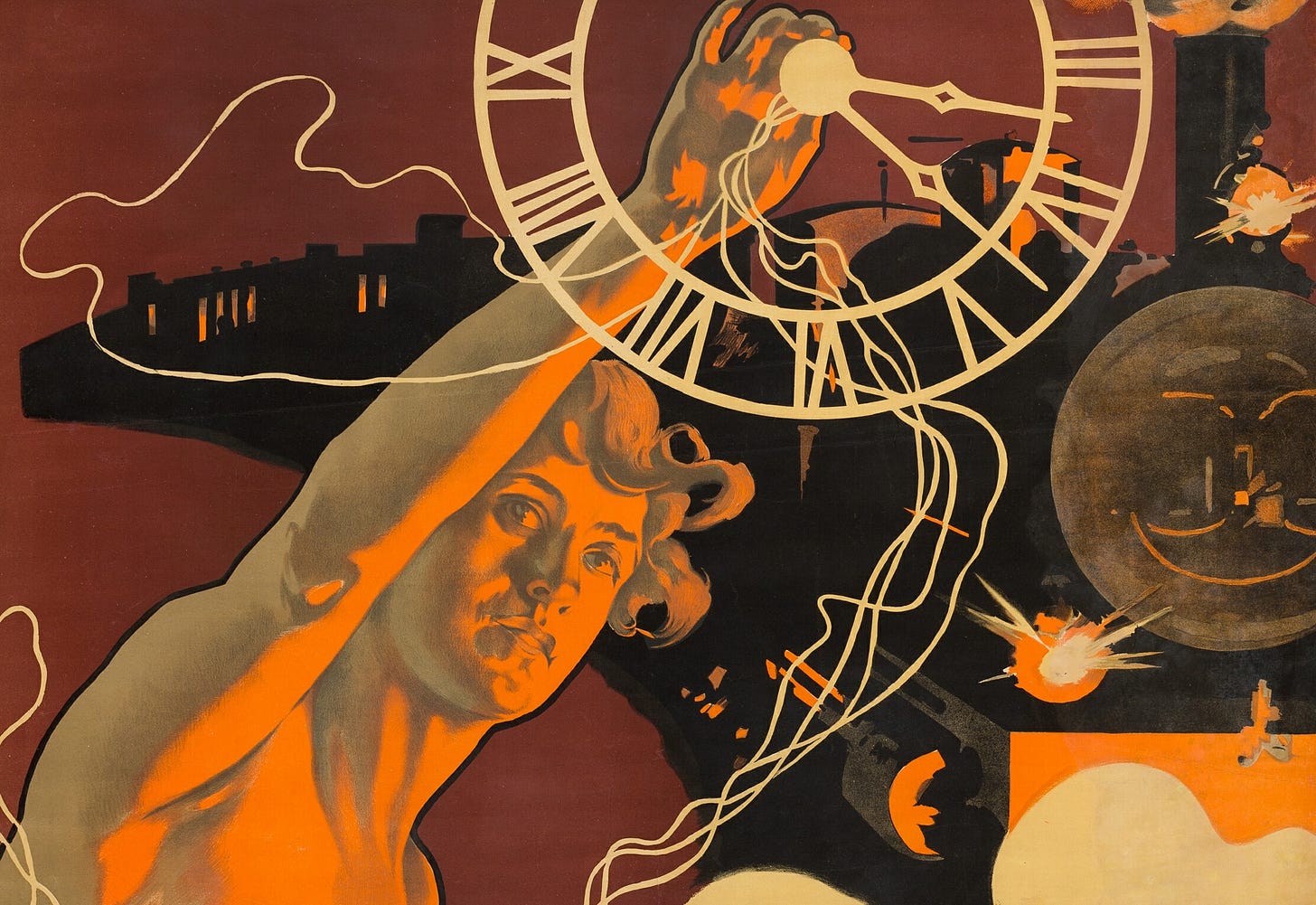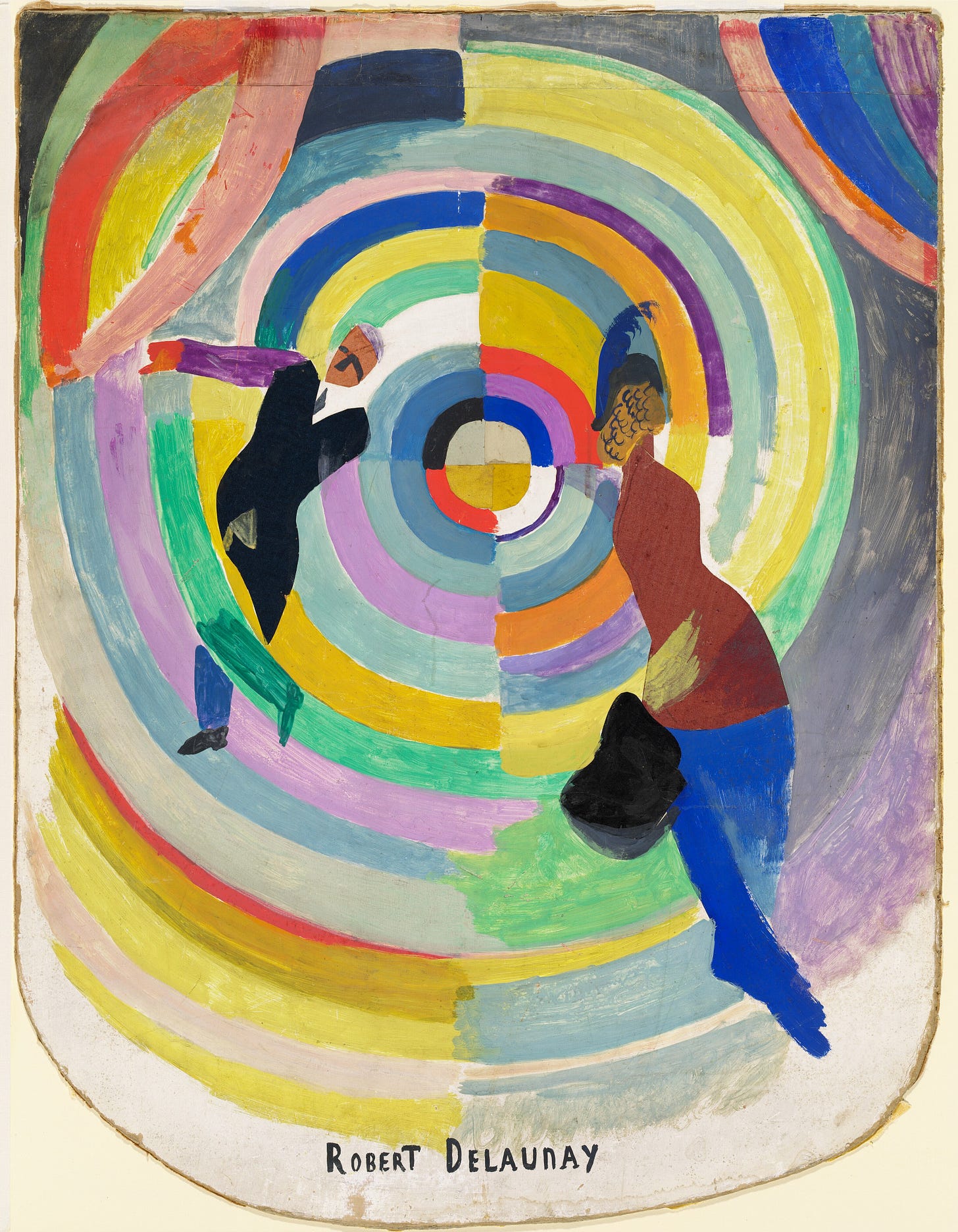AI and the end of journalistic time
What happens when the news isn't new anymore?

This morning I was talking with a friend about the Danish philosopher Søren Kierkegaard, who always seemed like a man out of place.
I don’t just mean this in the old-school existential sense of alienation from the self or from God. After Kierkegaard picked a fight with a local satirical newspaper in Copenhagen — unwise, given that Kierkegaard could be incredibly self-involved and irritating — The Corsair ran cartoons depicting the local philosopher as a weirdo who wears lopsided pants. Apparently this was devastating, especially for Kierkegaard’s walks about town. The Søren Kierkegaard Research Centre in Copenhagen recounts this incredible episode:
“In no time Kierkegaard had become a laughable advertisement for The Corsair. Copenhagen had been a source of his daily ‘emersion in people,’ a provision for inspiration and mental health. It was now transformed to a ‘barricaded little pit, without proportions, a rotting bog’ populated by a screaming mob, whose stares and smirks accompanied the tortured scholar wherever he went. Kierkegaard, who had done everything he could to hide behind pseudonyms, was identified by the masses, who shouted ‘either-or’ and ‘Søren’ at him on the streets. It went so far that his tailor recommended that he find another place to buy his clothes because the negative talk about the pants he’d made for Kierkegaard was hurting the reputation of his business. Kierkegaard’s journals abound with small reports:
“‘Every butcher boy believes that he’s entitled to insult me on orders issued by The Corsair; the young university students smirk and giggle (…). The least thing I do, even if I merely pay a visit to someone, is mendaciously distorted and repeated everywhere. If The Corsair learns of it, it prints it, and it’s read by the entire population.’”
Even his tailor disowned him! Because this is a blog and I’ll wander toward a greater point about AI and journalism when I feel like it, this gives me an opportunity to reference one of the great chapters of street-harassment internet lore, from a once-obscure interview that the actor Jesse Eisenberg gave to the British magazine Total Film in 2009:
EISENBERG: Since I was 18 I’ve got to be in movies so sometimes you want to be self-deprecating to offset people who feel some aggression toward you for being in stuff. People on the street sometimes will say mean things to me.
INTERVIEWER: Like what?
EISENBERG: I get called Napoleon Dynamite because I have curly hair. I live in New York City and I ride a bicycle. I always bike down 9th Avenue and there’s this kid who goes to school there named Abraham. Every time I pass him, he calls me Napoleon Dynamite. He screams it out and his friends laugh. That was a fine movie but I wasn’t in it.
INTERVIEWER: What do you say back?
EISENBERG: I say, “Please Abraham, I’m not that man.”
It’s a curious question, whether it hurts more to be seen or to be mis-seen. Kierkegaard’s encounter with the Copenhagen newspapers, who sized him up as the hyperbolic scold that he sometimes really was, led him to write stuff in his journals like “the ‘journalist’ is the epitome of the deepest apostasy of humankind from God.” Today we would call this posting cope.

But Kierkegaard also wrote thoughtfully about journalists and journalism’s role in the broader world of ephemera that filled life in the 19th century. The proliferation of print production and the free press (or at least a more liberal one) gave public life, and the life of the mind, a daily rhythm. “These people call themselves after the day: journalists,” Kierkegaard wrote, after the French jour. “All journalism is a writing at dawn, at the break of day — a writing that exists between a day that has already passed and a day that is yet to begin,” Tom Vandeputte writes of Kierkegaard’s contemplations in “Critique of Journalistic Reason: Philosophy and the Time of the Newspaper.”
Of course, in the turbulent 19th century, knowledge of the world arrived in daily editions, and philosophers of the day came to think of progress in daily increments. ("The newspaper reading of the early morning is a kind of realistic morning prayer,” Hegel famously wrote. “One orients one’s attitude towards the world either through God or through that which the world is. The former gives as much security as the latter, in that one knows where one stands.”)
But the metabolism of journalistic time changed in the 20th century: it sped up as the industry got older. Advancements of broadcast technology — culminating most spectacularly with the launch of CNN, a 24-hour breaking news cable channel, and then the world wide web — started moving the clock hand of current events forward in a sweep rather than by ticks. News was whatever was happening right now.
Journalists crested the summit of real-time news in the 2010s on Twitter’s chronological timeline. It was the early days of the platformification of news, and for the first time in history, the journalism industry’s professional class briefly shared the same workplace and got to rush a lot of stuff out to the public without editing. If you ever wanted to know the very latest, you simply had to open the app.
The Twitter of those years was a historical phenomenon that might never happen again. Something weirder is upon us. The longstanding 20th century paradigm of news as what’s happening right now has started to break down.
We all feel it. The jour has started to leave journalism.

The longtime civil union of journalism and timeliness has started to dissolve. I wouldn’t call it a divorce, because that would imply the separation is consensual.
The classical daily tempo of newspapers has slowed in ways that pain newsroom workers and the loyal subscribers who remain. Consolidation of printing plants, driven by rising prices and weakening consumer demand, has pushed newsroom deadlines earlier to the point that it’s harder every year to create a timely print edition. Sports scores stop making it in. Stories for the web run later or not at all. Even the New York Times couldn’t squeeze Donald Trump’s recent felony conviction onto the front page the next morning’s print edition for my Los Angeles newsstand.
Online, the now-or-never tempo of the social-driven 2010s has slowed dramatically inside the speed trap of the platforms’ recommendation algorithms. The existence of the algorithmically powered For You feed posits that social media users want a magazine of best-of recent happenings, not a fire hydrant of the now. Sometimes TikTok doesn’t even bother showing you videos from this year. This would be less of an issue if the public directly visited news outlets’ websites, 1990s-style, but our most recent survey data shows that consumers increasingly prefer to encounter journalism via a platform.
But it’s the AI-powered search agent that’s poised to freeze and transform journalistic time into something entirely new.

In the old days, journalists wrote articles that were intended to be read and comprehended by people — people like Hegel and Kierkegaard and your aunt and you.
But in a world of mass and perpetual publication, accelerated by generative artificial intelligence, maybe the most valuable consumer of a journalist’s article isn’t a human but an AI crawler. Humans are busy, get distracted, don’t have time to peek at the front page today. But a machine will always read you.
ChatGPT has made it possible to imagine living in something like Borges’ “Total Library,” where the limited number of letters and words of human language has been multiplied to create every possible sentence that can possibly be written. (Glue pizza, anyone?) The Total Library contains within its stacks all possible combinations:
“Everything would be in its blind volumes. Everything: the detailed history of the future, Aeschylus' The Egyptians, the exact number of times that the waters of the Ganges have reflected the flight of a falcon, the secret and true name of Rome, the encyclopedia Navalis would have constructed, my dreams and half-dreams at dawn on August 14, 1934, the proof of Pierre Fermat's theorem, the unwritten chapters of Edwin Drood, those same chapters translated into the language spoken by the Garamantes, the paradoxes Berkeley invented concerning Time but didn't publish, Urizen's books of iron, the premature epiphanies of Stephen Dedalus, which would be meaningless before a cycle of a thousand years, the Gnostic Gospel of Basilides, the song the sirens sang, the complete catalog of the Library, the proof of the inaccuracy of that catalog. Everything: but for every sensible line or accurate fact there would be millions of meaningless cacophonies, verbal farragoes, and babblings. Everything: but all the generations of mankind could pass before the dizzying shelves -- shelves that obliterate the day and on which chaos lies -- ever reward them with a tolerable page.”
Borges imagined the Total Library as a subaltern horror of meaningless. But if we’re living out the nightmare, Hell looks like a lot of people disagreeing whether OpenAI’s Total Library is 1. terminally useless or 2. potentially so powerful that it marks the end of humanity.
One thing that seems certain is that the combination of powerful digital surveillance with a dexterous digital librarian is that the idea of human journalists shoving news at people who don’t want it sounds ever less probable. Facts exist whether people care about them or not; maybe the library visitor doesn’t want to see all the newest ones today. Perhaps it’s a better use of everyone’s time if the machine catalogues those facts and assembles them once they’re requested, if ever. Perhaps journalistic time is less valuable to knowledge as something current than as something archival.
Naturally, I hate this.

The project of the free press in a liberal democracy isn’t simply to make information available to the individual, but to intrude, to rouse, to construct a public. Solipsism — loneliness, really — is one of the lethal risks of the liberal society. As De Tocqueville wrote:
It often happens, on the contrary, in democratic countries, that a large number of men who have the desire or the need to associate cannot do so; since all are very small and lost in the crowd, they do not see each other and do not know where to find each other. Along comes a newspaper that exposes to view the sentiment or the idea that came simultaneously, but separately, to each of them. All head immediately for this light, and these wandering spirits, who have been looking for each other for a long time in the shadows, finally meet and unite.
Sometimes teasing the grouchy local philosopher is how you help make the lonely self stand taller next to the enormity of the world. A little attention hurts sometimes. But tomorrow is another day.

